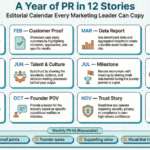Table of Contents
ToggleThe Ethics of PR: Balancing Advocacy and Honesty in the Information Age
- What is public relations (PR), and what ethical issues does it face?
Managing a company’s communication with its clients, stakeholders, and the general public is known as public relations (PR). Although PR has been a discipline since antiquity, the modern world has given it more attention and relevance as a result of the quick development of media and technology. Building relationships with the public is the goal of PR in order to establish and uphold a positive image for an organization.
However, navigating PR ethics is not always simple. In order to guarantee that their messaging is truthful yet persuasive, PR professionals must make an effort to walk the fine line between advocacy and honesty. This is a difficult endeavor since different parties may have different ideas on what makes a message “true” and “honest.”
To make matters worse, the dissemination of information and news cycles in this era of information can either harm or enhance an organization’s reputation. Therefore, it is crucial to uphold uniform ethical standards across all areas of communication. The numerous difficulties in striking a balance between advocacy and truthfulness are covered in this guide, along with the best methods for conducting ethical conversations and actions.
- Is honesty at the core of PR morality?
Public relations (PR) is a very sophisticated and nuanced field of work. To get specified results, it entails managing, communicating with, and influencing public opinion. It has an ethical obligation to fairly represent both parties involved because it is fundamentally based on transparency and trust. Honesty is the cornerstone of this profession’s ethical standards.
Sincerity serves as the cornerstone of any ethical interaction and promotes trust between a PR expert and both their clients and the general public. A communication breakdown results from a lack of trust and genuine understanding in public relations. The foundational elements of trust are professionalism and dependability, and these ideas cannot be realized without honesty.
Professionals in public relations must utilize precise, factual language. Too simplified or biased wording may result in incorrect or deceptive interpretations. These falsehoods have the potential to ruin reputations and result in damage that cannot be undone. To ensure that important information is accurately communicated, the truth must always be at the center of all communication activities.
To guarantee that the intended message is correctly received and conveyed, every message must be defined clearly and honestly. It is wise to err on the side of caution and always supply precise information because misinformation might have detrimental repercussions. Public relations specialists shouldn’t be afraid to be honest, even when companies are accused of breaking moral laws; they must admit any wrongdoings.
Honesty is ultimately necessary for real morality in public relations. When creating a message, the words chosen have an impact. Each message must be truthful and accurate to prevent being misconstrued or to gain an advantage. Honest communication reflects the value of openness and transparency and indicates respect for the recipients. Therefore, honesty is at the core of PR morality.
- The Basis for Ethically Balanced PR
Public relations has long played a crucial role in business and corporate communication. In an ethical and responsible manner, PR professionals are expected to effectively express their organization’s beliefs, mission, and reputation. Understanding the underlying ideas and elements of effective PR campaigns is necessary for ethically balanced public relations. These consist of:
establishing a precise set of ethical standards and goals for each PR endeavor.
a thorough awareness of the obligations and legal ramifications related to any remarks or materials supplied.
ensuring that all exchanges and interactions respect others and adhere to the accepted norms and procedures in the sector.
Create a plan for responding to questions and information requests in a timely and accurate manner.
promoting openness across all levels of participation and across the whole organization.
achieving a balance between advocacy and truthfulness to advance credibility.
assessing and updating corporate rules and processes that support moral behavior on a regular basis.
accepting accountability for any errors that may occur.
These guiding principles aid in ensuring that PR initiatives are morally upright and reliable from conception to conclusion. Following an ethical code guarantees that any messages provided to the public are honest and truthful. This strengthens the brand’s legitimacy and builds public trust in the business.
In the end, social responsibility, respect for others, honesty, and transparency are the cornerstones of ethical PR activities. To protect privacy and uphold the public’s confidence in their message and image, organizations must constantly work to strike a balance. Businesses can successfully communicate their messages while adhering to their basic ethical beliefs by following these guidelines for ethically balanced PR.
- Transparency as a Fundamental PR Principle
PR is a crucial business tool that may help mold perceptions, forge connections, and foster brand loyalty. Therefore, it is crucial that transparency always take precedence when engaging in PR operations. Any communication must start from a place of honesty and openness in order to be effective. People are more likely to trust communication when they are aware of the circumstances surrounding it, which increases the likelihood of successful outcomes.
Being upfront and truthful about the goals and intentions of PR campaigns, as well as any possible problems or conflicts, is a key component of transparency. It also entails being open to criticism and ensuring that the public has access to reliable information. This can entail making all research accessible, disclosing any conflicts of interest in the open, and taking measures to ensure that inaccurate information is used to counteract any unfavorable perceptions.
Furthermore, it’s critical to establish reasonable expectations and offer regular updates. People want to know what will be done with their suggestions or input and whether any actions have been taken as a result. Additionally, it’s critical for businesses to be transparent about their achievements and failures and to explain the rationale behind certain decisions. Businesses may develop trust and boost credibility with their audiences by establishing a culture of transparency.
In all of their public relations efforts, corporations and organizations must maintain transparency. Businesses may increase audience trust and make sure their PR campaigns are successful through the timely delivery of reliable, truthful information. Transparency will foster an atmosphere where candid communication is appreciated and help keep discussions honest and moral.
- PR advocacy and interest disclosure
Public relations (PR), which is the activity of establishing and preserving relationships between an organization and its public, includes advocacy as a key component. Relationship-based PR is frequently viewed as a strategy to bring about societal change. However, advocacy carries a heavy burden of duty; organizations must constantly be conscious of the causes they are supporting and how they relate to their audiences.
When participating in advocacy, all PR professionals must understand the significance of disclosure. Disclosure is the term used to describe any potential conflicts of interest that are made known to the public by an organization. In addition to financial relationships, any other kind of relationship or circumstance that can affect how the general public perceives a message is covered by this declaration. For instance, if a business is promoting a cause to its clients, it must declare any affiliations it may have with relevant groups.
Additionally, PR experts need to be aware of the moral ramifications of taking sides in a discussion or issue. The truth of the topic must always be accurately and factually conveyed when advocating. It’s crucial to take into account a variety of viewpoints and the repercussions of the position being taken. Organizations too frequently adopt positions without fully appreciating the effects of their choices. However, businesses may make sure they are not accepting liability for choices or results they do not fully understand if transparency and disclosure are practiced.
Organizations must always be open and truthful about their goals, plans, and reasons in order to practice ethical public relations. Along with promoting their own interests, this entails being honest and clear with their audiences about any potential conflicts of interest. A successful and educated public relations plan must include transparency and disclosure.
- PR Ethics in the Age of Social Media
Social media is now a crucial component of public relations (PR) in the digital age. Social media offers a singular chance for businesses to advertise their goods or services due to its unmatched access to large audiences. But while using these platforms, ethical considerations must be kept in mind, as with all aspects of PR.
Social media content has the ability to reach millions of people, so it is crucial to make sure that the posts are moral and consistent with the organization’s values. It is crucial for PR experts to take into account how their content may affect public opinion while adhering to regulatory obligations.
Social media also forces businesses to have two-way discussions with customers, which increases the strain on the PR team’s ethical obligations. Understanding cultural norms, valuing consumer input, and appropriately responding are all necessary for this. Instead of using combative words, discourse should be respectful, and all contacts should be handled professionally.
When utilizing social media, it’s also critical to be aware of copyright regulations and plagiarism. Users should be careful to give due credit for any work that has not been entirely their own, and they should refrain from stealing other people’s ideas or photos. It is also crucial to protect user privacy by not disclosing private information online.
Finally, businesses should work to improve the reputation of their brands. This entails abstaining from immoral actions like publishing fraudulent reviews, altering data, or telling lies. The objective should be to gain credibility and confidence while giving truthful information about the organization’s operations.
In conclusion, when using social media platforms, PR professionals must keep ethics at the forefront of their job. Organizations can build a favorable and trustworthy reputation in the public eye by adhering to best practices for ethical communications and executions.
- Socially responsible interactions and communications under the new rules of engagement
Public relations (PR) professionals must sift through the confusing world of online communication in the digital age. Greater accountability in how PR practitioners interact with the public is required as information becomes more widely available.
Building trust between a company and its audiences requires socially responsible messages and interactions. Social media may create a whole new world of connection and potential, but businesses must be careful to operate within the moral guidelines set forth for the public relations sector.
Whether it be through social network posts, blogs, or press releases, organizations must determine their target audiences and customize their messaging accordingly. Making sure the organization’s message is morally sound and gets to the proper people is crucial.
Businesses should be mindful of the potential for their message to go viral on digital media. If anything is presented irresponsibly online, it might come back to harm the organization since once it is uploaded online, it never truly disappears. It’s crucial to continually think about how viewers might interpret your messaging.
An organization’s online behavior must be taken into consideration since with tremendous power comes great responsibility. Misuse of personal information, insufficient interest disclosure, and offensive comments can harm a company’s reputation and jeopardize future trust.
A strong relationship between a company and its audiences is facilitated by producing interesting, practical material that adds to conversations and offers a forum for interaction. Additionally, monitoring conversational interaction and feedback can help businesses improve their messages and maintain contact with their audiences.
PR professionals must be careful with their words and actions online in light of the new rules of engagement. Organizations must work to encourage open communication and foster respect and trust among their members.
- Making Ethical Content Decisions When Creating Ethical Messaging
It is critical to take ethical factors into account while developing a message for a public relations campaign. A conscious effort must be made to respect moral standards and take into account any potential consequences of materials that are made available to the general audience in order to communicate ethically.
Public relations experts should make an effort to accurately and honestly develop their messaging. This entails refraining from exaggeration and deceptive comments and constantly disclosing all relevant information regarding any potential conflicts of interest. In order to keep communications relevant and intelligible, it’s crucial to maintain consistency throughout all forms of communication, from press releases to social media posts.
Additionally, an ethical message must consider the cultural sensitivities of its target audience. It is crucial, in particular, that messages avoid stereotyping, use language suited for the local culture, and prevent inciting hatred against any group or individual.
The graphics that are used in the communication should also be ethically considered while developing the messaging for a PR campaign. Videos and photographs must be tasteful and pertinent, and any stock photography must be appropriately credited. In some instances, using copyrighted content may require obtaining consent from the owner of the rights or entering into a license arrangement with the picture provider.
In the end, ethics ought to be at the center of all PR initiatives. When developing ethical communications, it’s important to consider all of their potential ramifications and make sure that they adhere to the values of truthfulness, accuracy, and sensitivity.
- Measuring the Effectiveness and Impact of PR
One of a company’s or organization’s most effective methods for reaching the public is public relations (PR), but how can you be certain that your PR is morally sound? To ensure that PR is carried out ethically and responsibly, it might be helpful to understand its influence and efficacy.
Understanding what ethical PR genuinely comprises is the first step in assessing the ethical impact and efficacy of PR. Transparency, interest disclosure, and honesty are some of the fundamental principles of ethical PR. Additionally, it is crucial to think about PR’s social responsibilities and develop language that is sincere, deferential, and value-driven.
Once these ideas have been grasped, it is time to assess the influence and efficacy of PR efforts. The main method for doing this is by assessing the media placements the PR team secured for the client and monitoring the level of reach and engagement the messages attained.
Evaluation of qualitative data, such as stakeholder sentiment, brand affinity, or other sentiment-related metrics, is also crucial. Focus groups or polls may be used at a deeper level of research to gauge public perceptions of PR outreach. The PR team must also evaluate any potential ethical problems that can result from their initiatives, such as the chance of promoting online echo chambers.
Overall, evaluating the ethical impact and efficacy of PR requires a comprehensive strategy that considers both quantitative and qualitative data. The correct procedures and technologies can help PR teams maintain the morality and efficacy of their work.
- Organizations, guidelines, and standards for ethically balanced PR
Organizations must set norms and criteria to ensure ethical PR efforts in the era of the internet and readily available information. Organizations should work to develop policies and procedures that support a PR strategy that is ethically and fairly balanced. This entails being aware of the equilibrium between advocacy and sincerity and making sure that any messaging or encounters are guided by this equilibrium.
When it comes to ethical PR practices, different organizations may have varying standards and norms. All organizations should, however, have a few important considerations in mind while drafting their policies. For instance, all businesses should endeavor to be transparent in their PR efforts and to communicate with truthful and correct information. All companies should also make sure that their messaging takes into account the social media era as well as the applicable laws and regulations.
Organizations ought to work on creating procedures for handling moral dilemmas. This can entail assembling a group of specialists who can assess any potential ethical dilemmas and provide advice on how to handle them. Organizations should also consider how they can gauge the success and impact of their internal and external communications.
Organizations can lay the groundwork for effective communications and interactions by establishing policies and procedures to ensure ethical PR. It is crucial to have ethical standards in place as the world continues to transition into the digital era.
- Best Practices in Public Relations for Ethical Communications and Actions
Public relations are a crucial component of branding and marketing. It is an essential tool for engaging audiences and stakeholders and fostering good advocacy. However, when working in the PR industry, ethical issues must be kept in mind. Understanding the best techniques for moral PR messages and executions is one of the most crucial components of this.
It is crucial to keep the end result of building meaningful, genuine connections in mind when thinking about best practices. Make sure all communication is open and truthful. Be honest while stating your aims and goals. To avoid the appearance of bias or manipulation, clarify any potential conflicts of interest. Always give out up-to-date, correct information, and make sure the proper disclaimer statements are prominently displayed.
Being respectful in all encounters is crucial, in addition to being open and honest. Respect your stakeholders’ standards as well as your own. Even if you disagree, respect people’s privacy and opinions. Be careful not to use foul words or imagery that could be taken as threatening or insulting when chatting online.
Consent is a crucial component of ethical PR. Make sure to get permission before communicating with any people or organizations. This entails getting consent before utilizing someone’s name, picture, or video footage and making sure all relevant parties are informed of how their information may be used.
Last but not least, keep in mind that ethical PR goes beyond just messaging. It ought to cover all actions taken when acting in a PR capacity. This covers things like occasions, advertisements, and product debuts. All decisions made must be morally righteous and considerate of the rights of those involved.
It is feasible to guarantee campaign success and uphold high moral standards by taking into account these best practices for ethical communications and executions in PR. This will contribute to the development of strong bonds between brands and their target markets, increasing the likelihood that they will interact with and support the brand.
- The Struggle with Finding Balance
Public relations specialists struggle to strike a delicate balance between advocacy and sincerity. The ethics of PR depend on striking the right balance between furthering one’s personal interests while remaining truthful and responsible with the public, whether it be while creating content for an organization or developing communications strategies.
In terms of ethics, the contemporary era of information overload places heavy expectations on PR professionals. Finding the balance between advocacy and honesty has become considerably more difficult than in the past because of the sheer number of news sources and channels. It’s important to develop messaging that connects with viewers in the digital environment in addition to conveying the truth.
Understanding and leveraging the benefits of social media involvement while also being aware of the risks posed by irresponsible practices are essential components of being ethical in modern public relations. Companies must practice transparency and disclosure of any interests they may have in order to avoid the possible negative effects of unrestrained campaigning.
In order to preserve a positive reputation and foster trust, organizations must also make an effort to adhere to ethical norms and principles. Finding a balance between advocacy and candor ultimately depends on the individual and their capacity for socially acceptable communication. To be able to make moral decisions in all of their communications initiatives, public relations professionals must always work to stay knowledgeable and accountable.
Frequently Asked Questions about “The Ethics of PR: Balancing Advocacy and Honesty in the Information Age”
Public relations (PR) is what, exactly?
Public relations (PR) is the process of controlling the dissemination of information between the general public and a business or organization. It is crucial to the success of any business since it influences consumers’ perceptions of a good or service.
Is honesty at the core of PR morality?
A: Honesty is the cornerstone of PR morality, yes. Honesty is essential because it fosters healthy connections with customers and stakeholders. When communicating with the general public, it is crucial to be truthful and factual in order to foster trust.
What fundamental principles underpin effective PR?
Successful PR relies on a number of fundamental principles, including transparency, advocacy, disclosure of interests, the development of ethical messaging, and the evaluation of the efficiency and impact of PR in terms of ethics.
How does social media influence the ethical facets of PR?
Social media has fundamentally altered the field of public relations, bringing both new opportunities and ethical challenges. Companies must make sure they are adhering to current rules and regulations and maintaining a level of transparency in their communications with the help of the increasingly sophisticated tools accessible online.
A: Yes, there are organizations, standards, and rules for morally sound PR.
A: Yes, there are organizations that provide standards and criteria for ethically balanced PR, such as the Global Alliance for Public Relations and Communication Management (GA). Other sector-specific groups and organizations also offer information and assistance when it comes to sustaining ethical standards.
What are the best procedures for PR-related ethical communications and actions?
Adopting sound research techniques, abstaining from unethical promotional strategies, focusing on the truth rather than spin, and obeying privacy regulations are among the finest practices for ethical communications and executions in PR.
How difficult is it still to strike a proper balance between advocacy and truth in the information age?
In the information age, maintaining a real balance between advocacy and honesty requires constant monitoring on the part of PR professionals. Transparency, trust, and accountability are more important now that PR has access to more advanced technologies.
Author Profile

- Nitin JainNitin Jain - C.E.O - India PR Distribution
- Nitin Jain is the founder and C.E.O of India PR Distribution - India's top Press Release Distribution and PR Agency. Nitin has more than 20 years of experience in PR, Corporate Communications, Digital Marketing, Branding Strategy and Lead generation.
Latest entries
 Press releaseJanuary 31, 2026A Year of PR in 12 Stories: The Editorial Calendar Every Marketing Leader Can Copy
Press releaseJanuary 31, 2026A Year of PR in 12 Stories: The Editorial Calendar Every Marketing Leader Can Copy EntrepreneursJanuary 5, 2026Nitin Jain Entrepreneur Behind India PR Distribution Success
EntrepreneursJanuary 5, 2026Nitin Jain Entrepreneur Behind India PR Distribution Success Press releaseNovember 20, 2025Meet Nitin Jain: CEO of India PR Distribution
Press releaseNovember 20, 2025Meet Nitin Jain: CEO of India PR Distribution Search OptimizationSeptember 16, 2025What Is Digital PR and Why It Matters for SEO Success
Search OptimizationSeptember 16, 2025What Is Digital PR and Why It Matters for SEO Success

